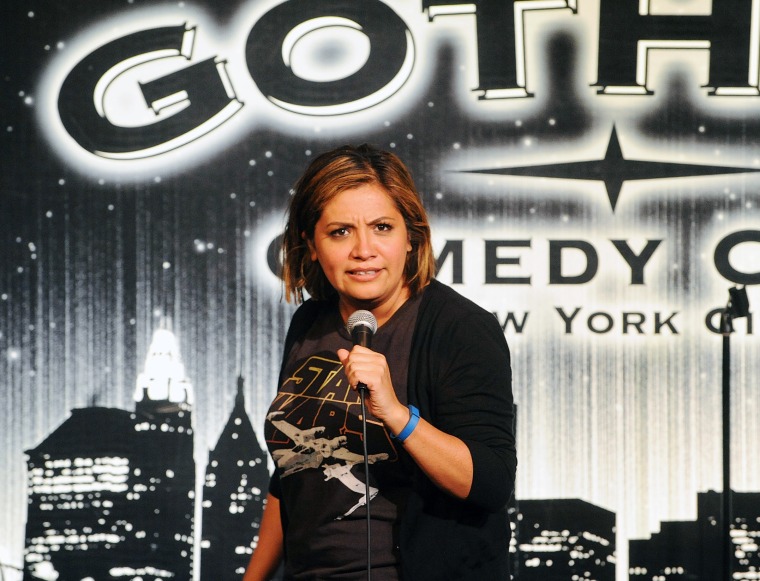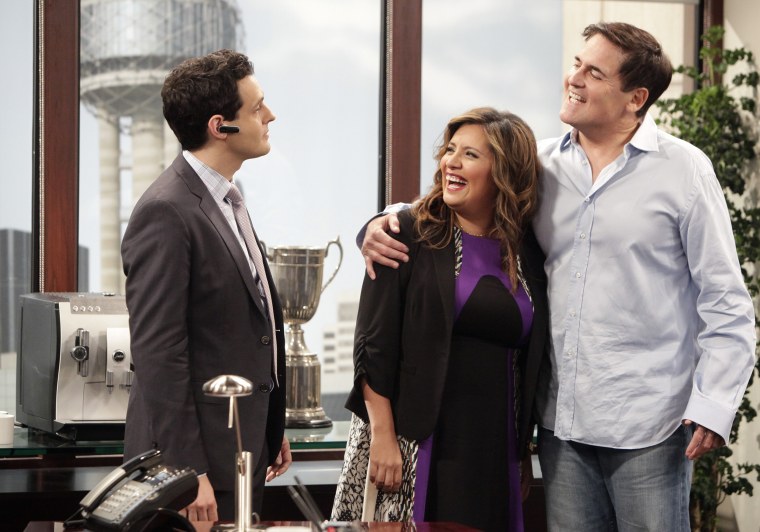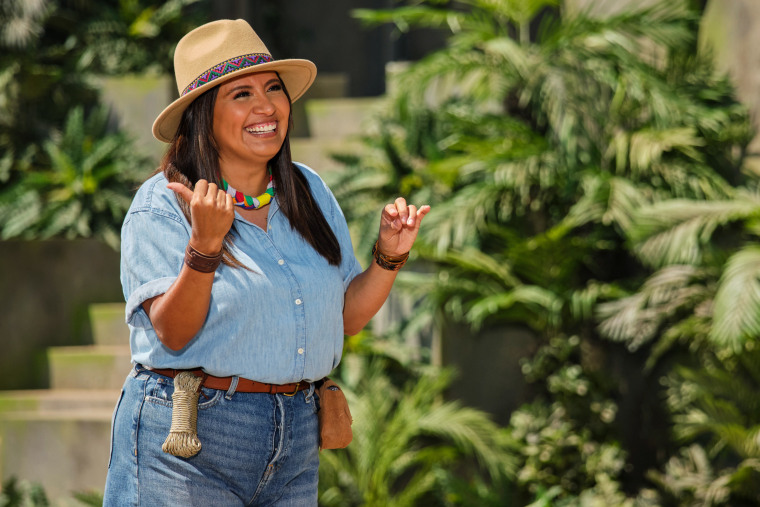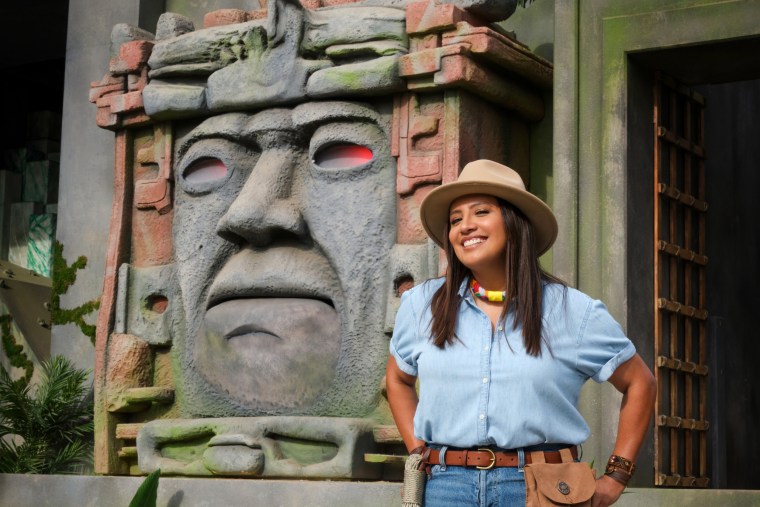More than seven years after becoming the first Latina to create, produce, write and star in her own prime-time sitcom, Cristela Alonzo has returned to network television with a new title: game show host.
In The CW Network’s push for seven full nights of original programming, Alonzo will host “Legends of the Hidden Temple,” an adult revival of a hit adventure game show that aired from 1993 to 1995 on Nickelodeon.

Having grown up on 90s pop culture, Alonzo, 42, noted that “Legends” emerged as part of a larger rise in game shows geared toward children. So when co-creator and executive producer Scott A. Stone approached her about hosting a new version and insisted on having a Latina at the helm, Alonzo jumped at the chance to lead a family-friendly show that gives adults an opportunity to relive some of their wildest childhood fantasies.
“With adults, we can make it more challenging, they can get dirtier, and that’s what’s fun. Because as grown-ups, we don’t get the chance to get dirty as much as we should,” she told NBC News in a recent interview. "We don’t have challenges where we’re climbing rocks — we have stuff that’s like, ‘Look, you need to fill this bucket full of lava, hold it on your head, and we’re just going to go from there. Is that cool?’ That allows people to have fun, but also it lets the kids watch it and think, ‘Hey, I can do that as an adult. I don’t have to stop being a kid ever.’”
An upbringing that "made me fearless"
Born and raised in San Juan in Texas, Alonzo — the youngest of four children raised by a single mother — lived her childhood under extreme circumstances, squatting in an abandoned diner with her family for the first eight years of her life. Throughout her storied career as an actor, writer, producer and stand-up comedian, she has spoken openly about growing up in poverty — an experience that, she reflected, “made me very fearless … because when you come from nothing, you feel like you’ve got nothing to lose.”
“One of the biggest questions I used to get asked all the time was: ‘How did you know you made it?’ And then I realized, ‘It was when I could put my debit card down for autopay on my bill,’” she said with a laugh.

For Alonzo, who was a self-proclaimed “big theater nerd in school” and always wanted to be on Broadway, the fact that she can now pay her bills and work in the arts is “such a bonus” and “just an absolute gift,” but it hasn’t been without her fair share of professional challenges.
In college, Alonzo had a voice teacher who told her that, as a Latina, the only viable stage roles that she could land would be for productions of “West Side Story” and “Chorus Line” — “and that was it,” she recalled incredulously. “But it was because back then, casting was so literal. We didn’t have the ‘Hamilton’ casting that we have now … Everybody had to be so exact.”
Breaking the comedic mold, making history
In the early aughts, she was looking to make her next move when she answered an “office help wanted” ad for a comedy club in Dallas. Despite not having any prior experience in administrative work, Alonzo, who was already a longtime fan of stand-up comedy but never thought of it as a potential career, was able to watch various comics and joked that it was “the ones that weren’t so great that made me think, ‘I could do this.’”
By the time she began doing stand-up in 2003, she was aware that she didn’t fit into Hollywood’s “traditional” mold of a Latina creator, especially at a time when there were not many Latina comedians or actors on traditional sitcoms. “I told myself, ‘If I ever wanted the chance, a legitimate chance, I was going to have to write it myself,” she said.
Eleven years later, Alonzo debuted “Cristela” and made history as the first Latina to create, produce and star in her own network sitcom. While “Cristela” had a respectable run, earning a nine-episode back order for a total of 22 episodes, ABC canceled the series after one season.

In the wake of the cancellation, Alonzo wrote that she “felt relieved,” saying “making a show out of someone’s real life is so incredibly hard to do” because “there are so many different hands involved that sometimes it gets exhausting and frustrating.” Simply put, she said, audiences “got to know the TV version of me.”
It wasn’t until the sitcom was canceled and she was back on the road, preparing for her Netflix special “Lower Classy,” that Alonzo began to understand “how it really affected people and how there were people that really connected to it.”
"A lot of me's out there"
“There was a moment at the end of the stand-up shows that I would always mention the TV show, and people could not stop cheering for minutes,” she said, smiling. “I was already doing social commentary in my stand-up, but there was a moment around that time that I thought: I need to be talking more about this … I need to normalize my story, because my story isn’t special. I grew up with people like me, and people need to know that there’s a lot of me’s out there. When we talk about creating content for Latinos, it’s not about creating content for Latinos; it’s about creating good content that happens to have Latinos in it.”
But Alonzo has not limited herself to only advocating for Latino representation in Hollywood. The morning after Donald Trump won the 2016 presidential election, she woke up and realized that she “just didn’t want to be funny." She took a step back and began visiting Latino communities across the country, using her online platform to discuss issues such as immigration, voting rights and affordable health care. “I started being really active with social issues on a different level where it became my life, and it still is, because I think it’s important to do that,” she said.
“I love to say that the more specific you are about where you come from and who you are, the more universal it is, because that’s one thing I realized, especially working with DACA recipients, working with immigration reform,” she said, referring to the Deferred Action for Childhood Arrivals program. "We might not be from the same countries and have the same backgrounds, but ... we’re all in it together.”
While she concedes that not everyone has a responsibility to use their platform, especially if they are not ready for public scrutiny and are not deeply committed to the cause, Alonzo said that she has never been afraid to learn from her mistakes while continuing to stand up for what she believes in, including her opposition to a recent Texas law banning all abortions after six weeks.
“I still want to speak for causes that I believe in — and that’s always going to be part of my life," she said. "But now, I’m ready to make people laugh."
When she first arrived in Hollywood, Alonzo said, like many of her peers, she wanted to please people and create the perception “that you’re OK with things, that you’re easy to work with.”
But she realized that, in doing so, others “don’t get to know the real you,” she said. “I’m at the point where I’m like, ‘OK, sorry. That was my bad for trusting that everybody got what I was doing.’ Instead of trusting people to see what I’m doing, I’m just going to flat-out show you what I’m doing, and this is what I’m doing.”
For Alonzo, who said that she would “eventually” like to star in her own show again, there are a number of changes that must be made to help advance onscreen Latino representation. Those include, but are not limited to, hiring more executives who will embrace diverse storytelling, casting a wider net for seasoned actors in their late 30s to 50s, and creating more feeder programs at major studios and networks that help to nurture existing talent across various mediums.

“A lot of it has to do with the industry not being able to trust people to actually write the characters that deserve to be written about,” she said. “If you’re hiring a Latino or a Latina writer, you’re hiring them because you like their writing, so allow them to write, and then we will see change.”
“Legends of the Hidden Temple” premieres Sunday at 8 p.m. on The CW.
Follow NBC Latino on Facebook, Twitter and Instagram.
